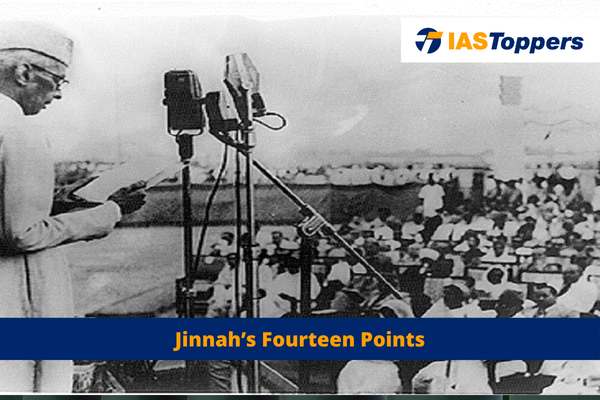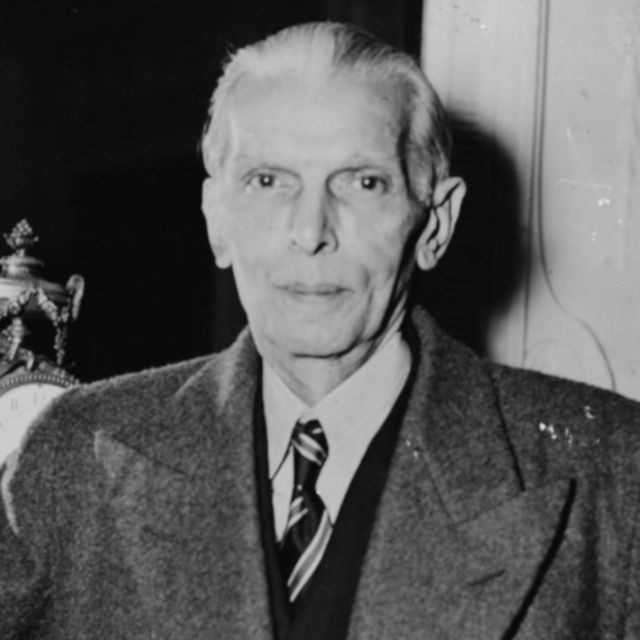Jinnah Fourteen Points articulated in 1929 hold a pivotal place in the history of the Indian subcontinent’s struggle for independence. This set of proposals was crafted in response to the Nehru Report, which was perceived by many as dismissive of Muslim interests. In this article, you will learn about Jinnah’s Fourteen Points, background, amendments proposed, responses, etc.
This article will provide key insights for GS Paper- I Indian History of UPSC IAS Exam.
Table of Content
- Background of Jinnah’s Fourteen Points
- Amendments Proposed by Mohammed Ali Jinnah
- Jinnah’s Fourteen Points
- Responses to Jinnah’s Fourteen Points
- Conclusion
- Frequently Asked Questions
- Reference
Background of Jinnah’s Fourteen Points
- Lord Birkenhead had challenged the Indians that Indians can’t frame their own constitution.
- Responding to the challenges, an All-Parties Conference was convened in February 1928.
- The Nehru report was the outcome of the All-Parties Conference.
Amendments Proposed by Mohammed Ali Jinnah:
- Jinnah acting on behalf of the Muslim League and while considering the Nehru report at the conference had put forth three amendments to the report:
- One-third representation shall be allocated to Muslims within the central legislature.
- Reservation of seats for Muslims in the legislatures of Bengal and Punjab, proportional to their population, until the establishment of adult suffrage.
- Vesting residual powers in the provinces.
- However, these demands were not fulfilled.
Jinnah Fourteen Points:
- Turning to the Shafi faction within the Muslim League, Jinnah had unveiled a set of fourteen points in March 1929.
- These points had subsequently formed the bedrock of the Muslim League’s forthcoming endeavors.
The Jinnah’s Fourteen Points were:
- Introduce a federal constitution with residual powers vested with the provinces.
- Establish provincial autonomy.
- Mandatory concurrence from the states constituting the Indian federation for any constitutional amendments introduced by the central government.
- Ensure sufficient Muslim representation in all legislatures and elected bodies within each province, without diminishing the Muslim majority or equality.
- Guaranteeing adequate representation for Muslims in governmental services and self–governing entities.
- One-third representation for Muslims within the central legislative body.
- One–third representation for Muslims in any central or provincial cabinet.
- Uphold the concept of separate electorates.
- Impose a condition that a legislative bill or resolution cannot proceed if three-fourths of a minority community deem it contrary to their interests.
- Safeguard the Muslim majority in Punjab, Bengal, and North-West Frontier Province (NWFP) from any territorial reconfiguration.
- Detach Sindh from Bombay.
- Pursue constitutional reforms for the NWFP and Baluchistan.
- Ensure complete religious freedom for all communities.
- Protect Muslim rights regarding religion, culture, education, and language.
- Top of Form
Responses to Jinnah’s Fourteen Points:
- Jawaharlal Nehru had called the Jinnah’s Fourteen Points them as “Jinnah’s ridiculous 14 points“.
- The congress leaders had refused to accept the Jinnah amendments as Jinnah’s proposals had envisioned a weak central government and provided more autonomy to the provincial government.
Conclusion
The Jinnah’s Fourteen Points proposed in 1929 played a pivotal role in shaping the political landscape of pre-independent India. These points emerged as a response to the Nehru Report, which Jinnah believed did not sufficiently address Muslim concerns in a predominantly Hindu Congress. Jinnah’s formulation aimed to safeguard Muslim interests and ensure political parity between Muslims and Hindus within the Indian federation.
These points underscored the demand for separate electorates, a significant aspect that would later influence the partition of India. They emphasized the protection of religious, cultural, and educational rights for Muslims and advocated for the proportional representation in legislatures. The insistence on these points reflected the deep communal divisions of the time and highlighted the growing distrust between the two major communities.
Ref:Source-1
| Other Articles in History & Culture | |
| Home Rule Movement | Partition of India |
| Nehru Report, 1928 | Poona Pact (1932) |
| First , Second and Third Round Table Conferences | Civil Disobedience Movement in India |
FAQs(Frequently Asked Questions)
In which session 14 points of Jinnah was held?
At a meeting of the Muslim league in Delhi in March 28, 1929, Muhammad Ali Jinnah announced his fourteen Points.
Why did Jinnah give 14 points?
Jinnah aimed to safeguard the interests of Muslims and hence he gave 14 points which covered the interests of Muslims.



